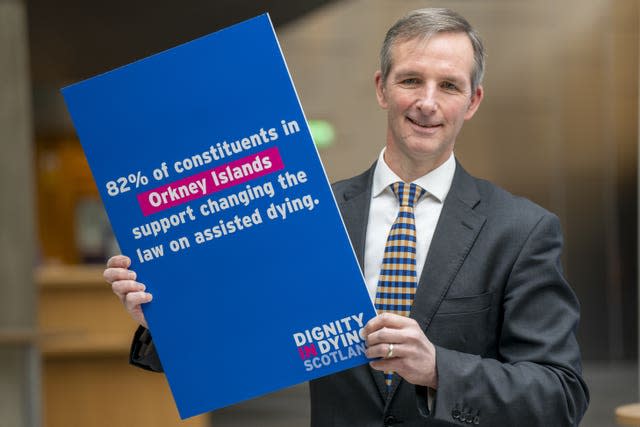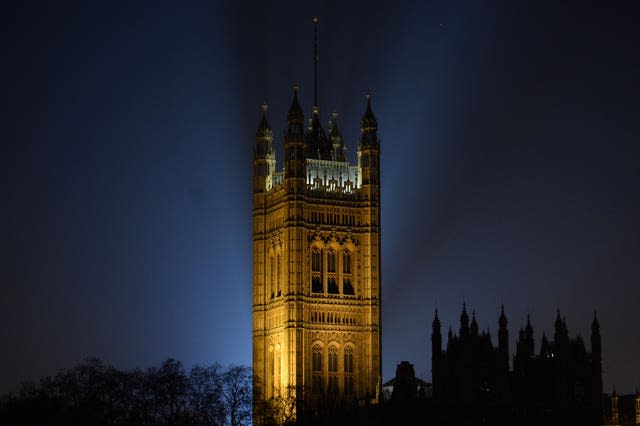Assisted dying: What is the law as MPs debate the controversial issue?
MPs at Westminster are debating assisted dying after a petition on discussing the controversial issue gained more than 200,000 signatures.
Demonstrators on both sides of the argument have gathered ahead of the Westminster Hall debate, at which there will not be a vote.
Here, the PA news agency takes a look at the situation as it stands across the UK, Ireland and Crown Dependencies.
– What is assisted dying?

This, and the language used, varies depending on who you ask.
Pro-change campaigners Dignity in Dying say that assisted dying allows a person with a terminal condition the choice to control their death if they decide their suffering is unbearable.
They argue that, along with good care, dying people who are terminally ill and mentally competent adults deserve the choice to control the timing and manner of their death.
But the campaign group Care Not Killing uses the terms “assisted suicide” and “euthanasia” and argues that the focus should be on “promoting more and better palliative care” rather than any law change.
They say legalising assisted dying could “place pressure on vulnerable people to end their lives for fear of being a financial, emotional or care burden upon others” and argue the disabled, elderly, sick or depressed could be especially at risk.
– What is the current law?

Assisted suicide is banned in England, Wales and Northern Ireland, with a maximum prison sentence of 14 years.
In Scotland, it is not a specific criminal offence but assisting the death of someone can leave a person open to being charged with murder or other offences.
– What is happening in Scotland?

Scottish Liberal Democrat MSP Liam McArthur published a Bill in March at Holyrood that, if passed, will allow people living in Scotland with a terminal illness to be given help to end their life.
Mr McArthur has said he is “absolutely convinced” the “long-overdue reform” will become law.
His Bill marks the third time MSPs will have considered the issue, with previous attempts to change the law failing to secure enough votes to proceed.
– What about other parts of the UK, Ireland and the Crown Dependencies?

Proposals for how an assisted dying law would work in Jersey – one of the UK’s three self-governing Crown Dependencies – were published in March, with a debate in the States Assembly planned for May, and a vote then expected on whether to proceed with drawing up legislation.
The earliest for a law to come into effect in Jersey would be spring or summer 2027.
The Isle of Man published a committee report in March on its Assisted Dying Bill, which had passed a second reading vote in the island’s parliament in October.
The report, which suggested possible amendments to the text of the Bill, was officially received by the island’s parliament in April and will have each of its 14 clauses debated during sessions in May.
In the Republic of Ireland, a committee recommended in March that legislation allowing for assisted dying in certain restricted circumstances should be introduced.
But it led to a split, with some committee members refusing to support the recommendations, arguing the case for assisted dying “has not been established”.
– What has Westminster said?

In February, a report by MPs on the Health and Social Care Committee warned that the Government must consider what to do if the law is changed in part of the UK or on the Isle of Man or Jersey, both of which are Crown Dependencies.
The committee, which did not make any recommendation for a vote on the issue, said legalisation in at least one jurisdiction is looking “increasingly likely” and suggested the Government must be “actively involved” in discussions about how to approach differences in the law.
On April 29, just ahead of the Westminster Hall debate, the Government’s response to the report was published.
It said it will discuss with devolved administrations and Crown Dependencies “the practical implications for England and Wales of legislation introduced to allow AD/AS (assisted dying/assisted suicide) and any constitutional issues that such legislation may present”.
It said it expects there would be time for discussions “whilst the necessary regulatory measures are put in place”, but committee chairman Steve Brine said “conversations need to start earlier than that”.
Labour leader Sir Keir Starmer has said he is “committed” to allowing a vote on legalising assisted dying should his party win the general election, while Downing Street has previously said it would be up to Parliament whether to again debate legalising assisted dying.
– Has the issue been debated in the UK Parliament before?
Yes. An Assisted Dying Bill, which would have allowed some terminally ill adults to ask for medical help to end their life, went before the Commons in 2015 and was rejected by MPs.
There was also a Bill proposed in the House of Lords during the 2021/2022 session which reached a second reading in the chamber, while a Westminster Hall debate on assisted dying took place in July 2022.
